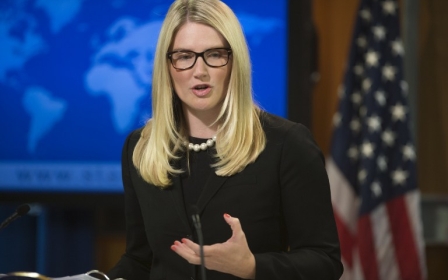Obama has 'a personal interest' in a good Iran deal

WASHINGTON – US President Barack Obama made a personal claim of responsibility for the outcome of nuclear talks with Iran in an interview published on Thursday.
“Look, 20 years from now, I’m still going to be around, God willing. If Iran has a nuclear weapon, it’s my name on this,” Obama said while speaking with The Atlantic magazine’s Jeffrey Goldberg.
“I think it’s fair to say that in addition to our profound national security interests, I have a personal interest in locking this down,” he added.
The Obama administration and other world powers are in the likely final stretch of talks with Iran on its nuclear programme. Negotiators have until the end of June to agree to a comprehensive accord after they approved a framework agreement in March.
The P5+1 group of world powers, which includes the US, UK, Russia, China, France, plus Germany, have sought unprecedented inspections and curbs on Iran’s nuclear programme in exchange for sanctions relief.
Defending his ability to broker a deal with Tehran, Obama said Iran’s leaders could be rational despite "deep strains of anti-Semitism".
“It is not at all contradictory to say that there are deep strains of anti-Semitism in the core regime, but that they also are interested in maintaining power, having some semblance of legitimacy inside their own country, which requires that they get themselves out of what is a deep economic rut that we’ve put them in, and on that basis they are then willing and prepared potentially to strike an agreement on their nuclear programme," he said.
Obama has sought to assuage critics in Israel and at home that a potential deal could be used as cover for Iran to illicitly acquire a nuclear weapon, which could then by used to threaten Israel.
In the Atlantic interview, Obama also addressed recent tensions between him and Israeli Prime Minister Benjamin Netanyahu.
He said that some of Netanyahu’s comments ahead of the Israeli election in March may have foreign policy implications.
When the Israeli PM said that “a Palestinian state would not happen under his watch, or [when] there [was] discussion in which it appeared that Arab-Israeli citizens were somehow portrayed as an invading force that might vote, and that this should be guarded against - this is contrary to the very language of the Israeli Declaration of Independence, which explicitly states that all people regardless of race or religion are full participants in the democracy,” Obama said.
“When something like that happens, that has foreign policy consequences, and precisely because we’re so close to Israel, for us to simply stand there and say nothing would have meant that this office, the Oval Office, lost credibility when it came to speaking out on these issues.”
He went on to say that criticism of Israeli policy should not be equated with being anti-Israel.
"What I also think is that there has been a very concerted effort on the part of some political forces to equate being pro-Israel, and hence being supportive of the Jewish people, with a rubber stamp on a particular set of policies coming out of the Israeli government.”
He added: "So if you are questioning settlement policy, that indicates you’re anti-Israeli, or that indicates you’re anti-Jewish. If you express compassion or empathy towards Palestinian youth, who are dealing with checkpoints or restrictions on their ability to travel, then you are suspect in terms of your support of Israel. If you are willing to get into public disagreements with the Israeli government, then the notion is that you are being anti-Israel, and by extension, anti-Jewish. I completely reject that."
Stay informed with MEE's newsletters
Sign up to get the latest alerts, insights and analysis, starting with Turkey Unpacked
Middle East Eye delivers independent and unrivalled coverage and analysis of the Middle East, North Africa and beyond. To learn more about republishing this content and the associated fees, please fill out this form. More about MEE can be found here.




